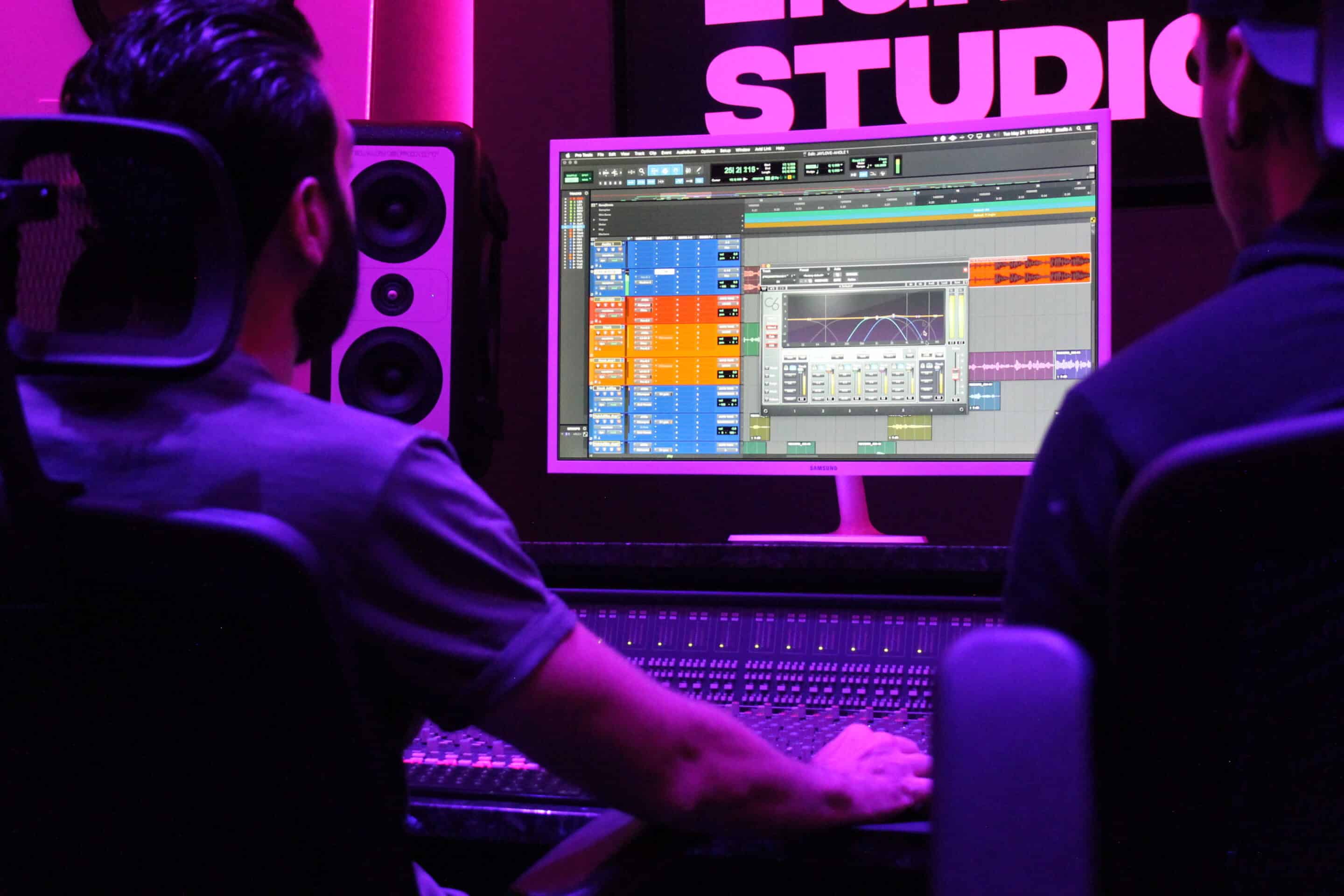Audio engineering is the backbone of music production. Music engineers are responsible for optimizing sound quality, calibrating levels and frequencies, and adding depth and dimension to a song. Imagine your favorite song without the crisp vocals, punchy beats, and immersive soundscapes that make it so captivating. The secret ingredient behind the magic of professional music lies in the hands of audio engineers. In this blog post, we’ll uncover why audio engineering is crucial to your song, and music engineers’ impact on various music genres, from EDM to rock and pop.
The Importance of Audio Engineering in Music Production
The skills of an audio engineer are essential to bring out the best in every recording, whether it’s a chart-topping hit or an indie masterpiece. Through a combination of technical expertise and an understanding of musical elements, audio engineers ensure that each track achieves its full potential. But what exactly does audio engineering entail? To create a polished final mix, setting up microphones and adjusting levels and equalization are essential. Additionally, applying effects and processing is vital to ensuring a well-balanced sound. From capturing the perfect vocal take to blending a symphony of instruments, audio engineering plays a pivotal role in making your music sound professional and captivating to listeners.
Sometimes, audio engineers are confused with music producers. But audio engineers play a role in not just music production, but also film and television production, live performance, and other media channels. They help preserve and hone sound quality, creating accurate portrayals of music or dialogue for broadcast. Audio engineers are responsible for recording, mixing, and reproducing sound using electronic audio equipment and ensuring studios have the necessary equipment to capture professional quality sound. Let’s break down some of the most significant ways audio engineers help make your music sound professional.

Enhancing Sound Quality
An audio engineer’s primary goal is to ensure superior sound quality. They can achieve this by employing techniques such as:
- Compression
- Equalization
- Saturation
- Microphone placement
These techniques enhance the clarity, balance, and overall quality of a song. Additionally, trimming each clip to retain only essential audio information and incorporating short fade ins and outs can further refine the mix, making it more intimate, upfront, and organic.
Achieving great sound quality isn’t just about the technical aspects however. It also requires a good ear, creativity, and an in-depth understanding of the music’s intended emotion and impact. By working closely with artists and music producers, audio engineers can ensure that the final mix not only sounds good, but also communicates the artist’s vision effectively.
Balancing Levels and Frequencies
Creating a balanced and cohesive sound is a fundamental aspect of audio engineering. Mixing engineers employ tools such as multitrack recording, panning, and frequency balancing to produce a unified and refined sound. Panning is utilized to position sounds within the stereo field, allowing for a sense of spatiality and differentiation between instruments. Meanwhile, equalizing frequencies can brighten some sounds, deepen others, and remove certain frequencies, creating a sense of depth and closeness in the mix.
This delicate balance ensures that each element of the song is audible and harmonious, allowing the music to shine. A well-balanced mix not only enhances the listening experience but also highlights the subtleties and nuances that make a song truly unique.
Adding Depth and Dimension

Audio engineering goes beyond simply making a song sound good. It also adds depth and dimension, creating a more immersive and engaging listening experience for the audience. Audio engineers do so by adjusting levels and frequencies, and incorporating effects such as:
- Reverb
- Delay
- Compression
- EQ
- Panning
Sound engineers can create a sense of space and depth in the mix. They can add effects to a piece of music such as compression, delays, EQ and Autotune by setting up microphones, running them into a mixing console, and balancing the volume. These effects can help create a unique sound and make the music stand out. They can also be used to correct mistakes in a recording. With the right audio engineering techniques, a song can truly come to life, enveloping the listener in a rich, captivating soundscape. We go more in-depth into how to master these techniques in our Bay Eight Sound Academy. If you’re interested in learning these skills, there’s still time to join our upcoming March session!
The Role of Mixing and Mastering Engineers

While audio engineers can have a number of different specialties, two key roles stand out in the music production process: the mixing engineer and the mastering engineer. Mixing and mastering engineers are crucial in transforming raw recordings into polished, professional tracks, but their responsibilities differ in key ways.
The mixing engineer focuses on blending individual tracks, adjusting levels, panning, and applying audio effects to create a cohesive and polished sound. On the other hand, the mastering engineer fine-tunes the final mix, ensuring it meets industry standards and is ready for distribution across various platforms. By utilizing mixing and mastering services, artists can achieve a professional sound for their music. If you’re in need of mixing and mastering services for your own projects, we offer this service online at an affordable price.
Mixing Engineer
A mixing engineer is responsible for audio mixing, which includes tasks such as:
- Combining individual tracks
- Adjusting levels
- Panning
- Applying audio effects
This process involves blending and modifying individual recordings to create a balanced stereo mix, and it’s a crucial step in the music production process.
In addition to their technical skills, mixing engineers must also have a good ear and a deep understanding of the music they’re working on. Their goal is not only to create a harmonious mix, but also to ensure that the artist’s vision is accurately represented in the final product. By working closely with the artist and music producer, a mixing engineer can help bring a song to life, ensuring it resonates with listeners and stands out in the competitive music industry.
Mastering Engineer
The mastering engineer’s role is to refine the final mix through the editing and mastering process, ensuring it meets industry standards and is suitable for distribution across various platforms. This mastering process involves applying various techniques such as:
- EQ
- Compression
- Limiting
- Stereo enhancement
These techniques are used to optimize the overall sound, ensuring consistency, and make the track sound professional and radio-ready.
A skilled mastering engineer can make all the difference in the final quality of a song. They have a keen understanding of the technical aspects of audio engineering, as well as the creative vision of the artist and music producer. By collaborating closely with the mixing engineer and taking into account the unique characteristics of the music, a mastering engineer can help ensure that your song sounds great in every playback system a listener might choose.
Impact of Audio Engineering on Different Music Genres

Audio engineering techniques can vary depending on the genre, with specialized techniques and methods tailored to emphasize the distinct qualities of electronic dance music (EDM), hip-hop and R&B, and rock and pop. These genres rely heavily on manipulating sound and incorporating effects, and the right audio engineering approach can significantly shape the style and character of the music.
Understanding the unique characteristics of each genre allows audio engineers to create a distinct sound that reflects the artist’s vision and resonates with the target audience. By employing genre-specific techniques and methods, audio engineers can ensure that each track achieves its full potential and stands out in the competitive music industry.
Electronic Dance Music (EDM)
Audio engineering in EDM focuses on creating powerful, immersive soundscapes, with emphasis on bass, synths, and dynamic range. The genre relies heavily on digital audio workstations (DAWs) and advanced software to manipulate and shape the sound, making audio engineering an integral part of the EDM music production process.
From crafting hard-hitting basslines to designing intricate soundscapes, audio engineering plays a pivotal role in bringing the energy and excitement of EDM to life. By employing specialized techniques, audio engineers can create a unique sound that resonates with fans of the genre and leaves a lasting impression on the dance floor.
Hip-Hop and R&B
Audio engineering in hip-hop and R&B prioritizes vocal clarity, beat presence, and a balanced mix of instruments and samples. These genres are known for their heavy use of samples, loops, and digital instruments, making audio engineering an essential component in the production process.
By focusing on the unique characteristics of hip-hop and R&B, audio engineers can create a distinct sound that reflects the artist’s vision and resonates with fans of the genre. From capturing powerful vocal performances to crafting infectious beats, audio engineering plays a crucial role in bringing the soul and energy of hip-hop and R&B to life.
Rock and Pop
Audio engineering in rock and pop music aims to:
- Create a balanced and polished sound
- Achieve instrument separation
- Enhance vocal presence
- Ensure overall cohesion
The genre often features a wide range of instruments and vocal styles, making audio engineering an essential part of the music production process, including composition. By employing techniques such as adjusting levels and frequencies, and incorporating effects, audio engineers can create a sound that reflects the artist’s vision and resonates with fans of the genre. From capturing powerful guitar riffs to blending lush vocal harmonies, audio engineering assists in bringing the emotion and energy of rock and pop music to life.
Choosing the Right Audio Engineer for Your Project

When selecting an audio engineer for your project, it’s important to consider their experience and expertise, communication and collaboration skills, and budget and timeline requirements. A successful partnership with the right audio engineer can ensure that your vision is accurately represented in the final product, and that your music stands out in the competitive industry.
By carefully evaluating your options and considering the factors discussed in this blog post, you can find the perfect audio engineer to help bring your music to life. Whether you’re an established artist or an aspiring musician, investing in quality audio engineering services can make all the difference in the success of your music career. If you are looking to get a project mixed and mastered, reach out to us here.
Experience and Expertise
An audio engineer with a proven track record in your genre and a strong understanding of the technical and creative aspects of music production is essential. Their experience and expertise can not only ensure that your music sounds polished and professional, but also that it accurately reflects your artistic vision.
When evaluating potential audio engineers, consider their past work, industry accolades, and client testimonials to get a sense of their abilities and style. A skilled audio engineer who understands your genre and shares your creative vision can be an invaluable asset in the music production process, helping you achieve the sound and impact you desire.
Communication and Collaboration
When selecting an audio engineer, consider the following:
- Their communication style
- Their willingness to collaborate
- Look for someone who is responsive, attentive, and proactive in addressing your concerns and ideas
With clear communication and a collaborative approach, you can ensure a successful partnership that brings the best out of your music.
Budget and Timeline Considerations
Budget and timeline considerations are also important factors when selecting an audio engineer for your project. It’s essential to find an engineer who can meet your financial and scheduling needs while still delivering a high-quality final product. Before starting your search for an audio engineer, establish a clear budget and timeline for your project. Keep in mind that investing in quality audio engineering services can make a significant difference in the success of your music, so be prepared to allocate resources accordingly.
Summary

In conclusion, audio engineering plays a pivotal role in the success of any music project. Enhancing sound quality, balancing levels and frequencies, and adding depth and dimension to your song can make a huge difference in how seriously you’re taken as an artist. With the right audio engineer on your team, you can ensure that your music stands out in a competitive industry and resonates with your target audience. Whether you’re an established artist or an aspiring musician, investing in quality audio engineering services can make a significant difference in the success of your music career.








